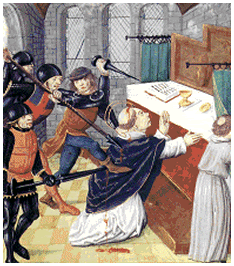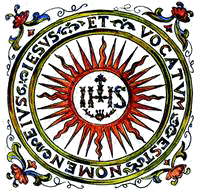
Patron Saint of the Clergy
1118 - 1170
FEAST DAY: DECEMBER 29
Saint Thomas Becket was born on the Feast of St. Thomas Aquinas in AD 1118, in London, and went to school with the canons regular in Surrey. He lost both parents in his early twenties, and at twenty-four Thomas assumed a position in the house of the Archbishop of Canterbury, Theobald. Theobald thought highly of Thomas, and provided him with several benefices. He also consulted extensively with the saint and after Thomas was ordained to the diaconate made him Archdeacon of Canterbury, a position below only the Bishops and Abbots. Thomas was also sent to Rome for the archbishop when needed.
In AD 1155 Thomas was made chancellor by King Henry II, and their friendship grew both professionally and personally. Thomas was a proud and irascible man throughout his life, but regardless his extensive "worldly" business and attachments his confessor testifies to his blameless character. He was also known for times of personal discipline and devout prayer, so his life seems to have been of somewhat dichotomous natures.
Theobald died in AD 1161. King Henry had expected to promote Thomas, but he had objections to being consecrated. However, Cardinal Henry "persuaded" Thomas of his need to assume the Archbishopric. The election was made in AD 1162 in May, and on Saturday of Whit-week Thomas was ordained a priest by the bishop of Rodchester. On the octave of Pentecost he was consecrated Archbishop by Henry of Blois, the bishop of Winchester.
The change in Thomas after his consecration was all-encompassing. He established a rule for himself, doubled the alms given to the poor, examined the candidates to the priesthood personally, reorganized the Archepiscopal household in a monastic fashion, visited regularly the monks in their cloister, and became moderate and tempered. The relationship between Thomas and Henry remained for the most part the same during the next year ...
... On December first he returned at Sandwich to much acclaim, but peace was there. The archbishop of York assisted in the coronation of Henry's son, in defiance of both Thomas and the Pope. Thomas had deposed three bishops along with Roger, the archbishop of York. When at London, the "boy King" refused to meet Thomas. At Bayeux the bishops were arguing their case, and in a time of untamed rage that plagued Henry, he uttered those fateful words that he wished Becket not in place as Archbishop anymore. The knights Reginald Fitzurse, William de Tracy, Hugh de Morville, and Richard le Breton took this remark as a wish for the Archbishop Thomas to die.
On St. John's day Thomas received a letter warning of the threat. The knights initially came to him demanding a release of the censures against the bishops, but he refused and they left angrily. They soon returned and Thomas was ushered off by attendants to the Church. Doors were shut, then reopened by Thomas when monks were shut out. At last only three men were with Thomas; then one, Edward Grim. The knights approached, with a subdeacon, and asked where the traitor Thomas was. He answered that no traitor was there, only an archbishop and priest of God. There he stood between the altars of St. Benedict and the altar of our Lady.
The knights demanded the release of censure once again, but Thomas refused. Edward Grim blocked the first blow, but it still lacerated the head of Thomas. They struggled, and St. Thomas called upon the Lord and His saints. He went to his knees and uttered that for Christ and His Church he was willing to die. The skull of the saint was struck by Richard le Breton. Laying upon the trancept, the subdeacon Hugh displaced the brain of St. Thomas with his swordpoint. Hugh de Morville alone struck no blow. They then fled the cloister. The martyr's body lay in the trancept with no one daring even to touch it.
Many doubt the intention of Henry to have Becket killed, but eighteen months after Thomas' canonization, Henry submitted to a public scourging as an act of humiliation. On the seventh of July, AD 1220, the relics of St. Thomas Becket were translated from the crypt to a tomb behind the high altar in an enormous gathering. In attendance were Stephen Cardinal Langton, archbishop of Canterbury; King Henry III; and Cardinal Pandulf, papal legate and archbishop of Rheims.
Read the entire biography from CIN.




















No comments:
Post a Comment